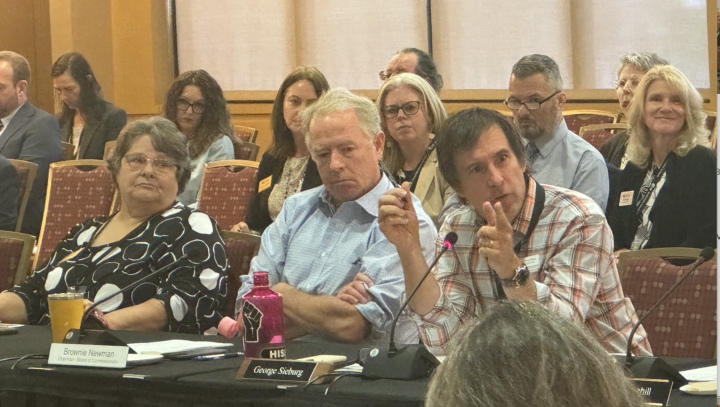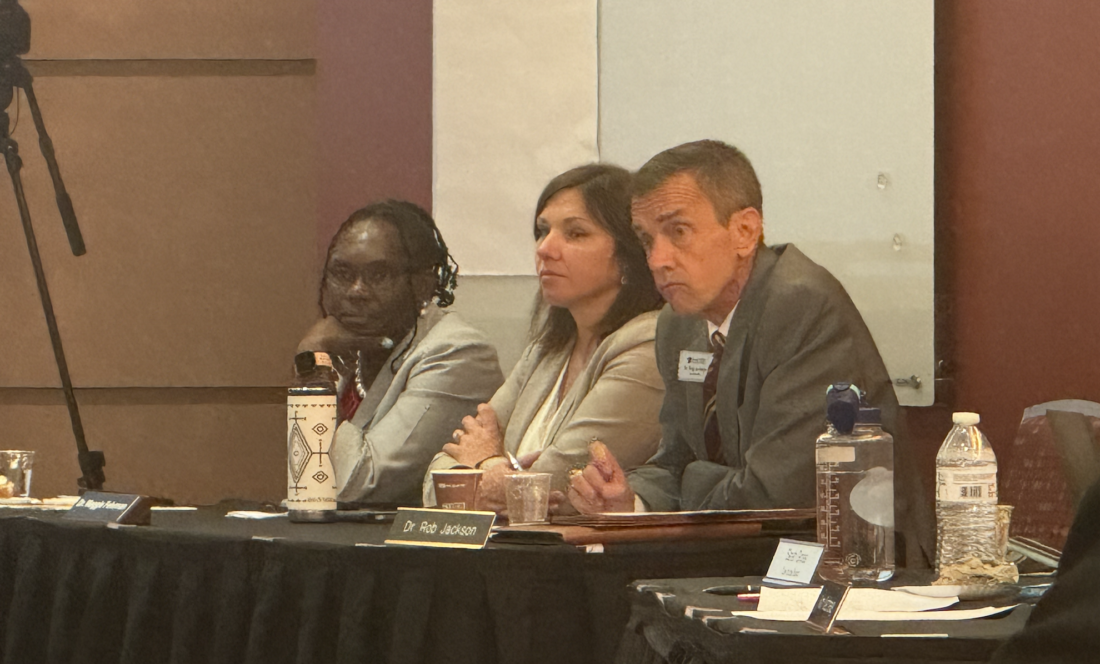During budget discussions this spring, some members of the Buncombe County Board of Commissioners complained that the county’s two school boards weren’t being proactive or collaborative enough in their requests for increased funding. On Aug. 22, they called a joint meeting with the Asheville City and Buncombe County boards of education to identify the three elected bodies’ shared purpose.
Heather Parkinson, Buncombe’s strategic policy and analysis manager who guided the three-hour discussion, said a joint meeting of this kind had not happened in her nearly seven years. The goal: Get the boards to coalesce around their collective priorities for the next five years and define what success looks like for education in Buncombe County.
In presentations, both district superintendents highlighted the erosion of state-level support for public schools as a top threat. Rob Jackson, superintendent of Buncombe County Schools (BCS), cited a study from the nonpartisan think tank Public School Forum, which ranked North Carolina 49th among states in percentage of its gross domestic product allocated to public education.
“For the success of our local public system, I think the stakes are really high because we’re not supported. We don’t have the support that we need,” noted Asheville City Board of Education member Rebecca Strimer.
Several officials pointed out that there is a missing link between the state’s funding of public schools and its constitutional mandate to provide every child access to a sound education. Buncombe County Board of Education member Rob Elliot argued that the recent expansion of the state’s private school voucher program — which could strip nearly $5.6 million from public schools in Buncombe County alone, according to state figures — shows where the N.C. General Assembly’s priorities lie.
“The values from the [state] leadership currently are to erode public education for a very specific reason,” he said. “I think [Buncombe County Commissioner Parker Sloan] said it best: ‘The cost of failure is greater than the cost of success.’”
County Commission Chair Brownie Newman directed the conversation toward what local officials can control.
Planning, noted Commissioner Al Whitesides, is critical. “We can’t wait until mid-May … to make a decision to put it in the budget in June,” he said.“This is something we’ve got to look at year-round.”

Newman and Sloan suggested that the three boards create multiyear spending plans with specific goals.
For county school board Chair Ann Franklin, a goal should be expanding preschool programs, which she argued can help eradicate issues that many students have when they enter kindergarten and carry through their educational career.
“You don’t graduate miraculously; you have a basis where the learning begins, and then you continue to build on that,” she said.
Another worry for both districts is a shrinking pipeline of available teachers. BCS’ Jackson reported that according to the N.C. State Board of Education, the number of teachers entering the workforce statewide shrunk by 10% from 2021-22 and 2022-23, and has decreased 43% over the last decade.
Both districts have programs in place to encourage current high school students to become future teachers, including Asheville City Schools’ (ACS) forthcoming Grow Your Own initiative.
Commissioners support a countywide Grow Your Own program.
Buncombe County is the lead entity on a state-mandated feasibility study concerning the potential consolidation of ACS and BCS, scheduled to be completed in January. While it wasn’t a focus of the meeting, conversation on the topic came up. Several officials were skeptical.
“The focus should not be on saving money through consolidation, but the focus ought to be on [how] what we do provides value. And if it takes two separate school systems to do that, that’s what it takes, and it’s valuable, and it’s worth it,” said city school board member Sarah Thornburg.
“We really don’t have any proof that consolidation would save money. Nothing that I’ve read or studied would indicate that in any way, shape or form. So let’s take it off the table and get to the things that really could benefit [us],” Franklin added.
Officials present from all three boards informally voted to continue having similar discussions throughout the year. Commissioner Jasmine Beach-Ferrara, city school board members Amy Ray and Liza Kelly and county school board member Peggy Buchanan were absent. It’s unclear when the next meeting will be.






School board members proclaiming there’s no evidence consolidation saves money tells you all you need to know about where this is going unless the state crams down the obvious solution.
There is no one obvious solution. But the main problem is that the State is starving traditional public schools while giving away no strings attached money through the voucher program. Since the state took away income cap limits on these voucher programs, many rich people who never had their children in the public schools have taken taxpayer money as a giveaway. Plus, the schools that accept vouchers are completely unregulated. … so the state does this while simultaneously saying they do not have enough money to fully fund traditional public education. … to try to say that the public schools are failing.
Correct
And really just take a look at the increase in number of administrators and support staff versus teachers. That’s where all the money goes.
How you create smaller class sizes and more personal attention is you stop diverting salaries and positions from the classroom to the admin office!
Huge administrative overlap between the Buncombe abd asheville school systems. Literally no reason to have both.